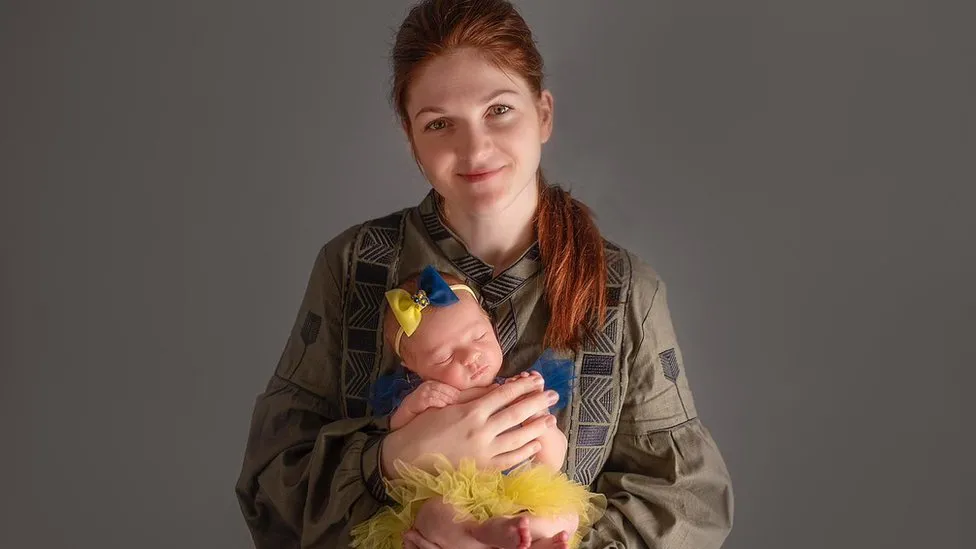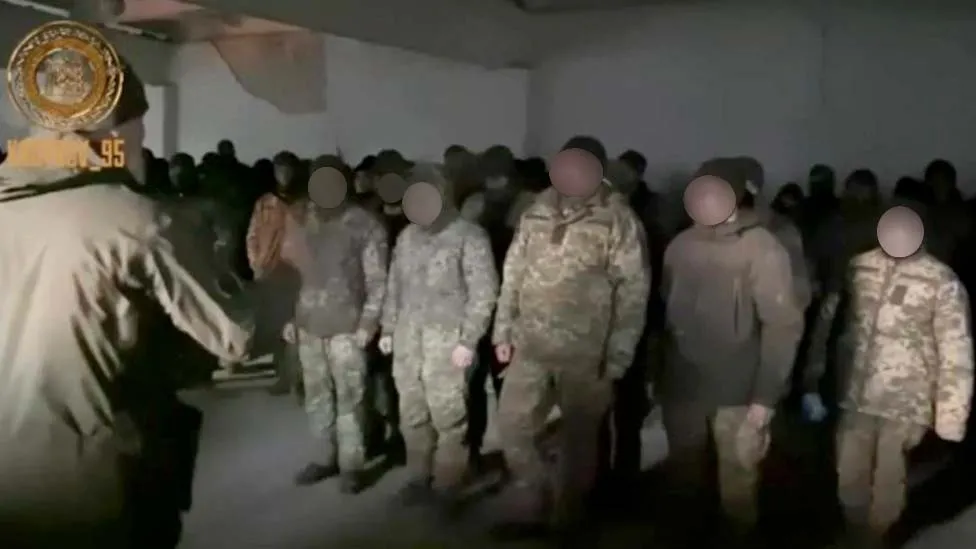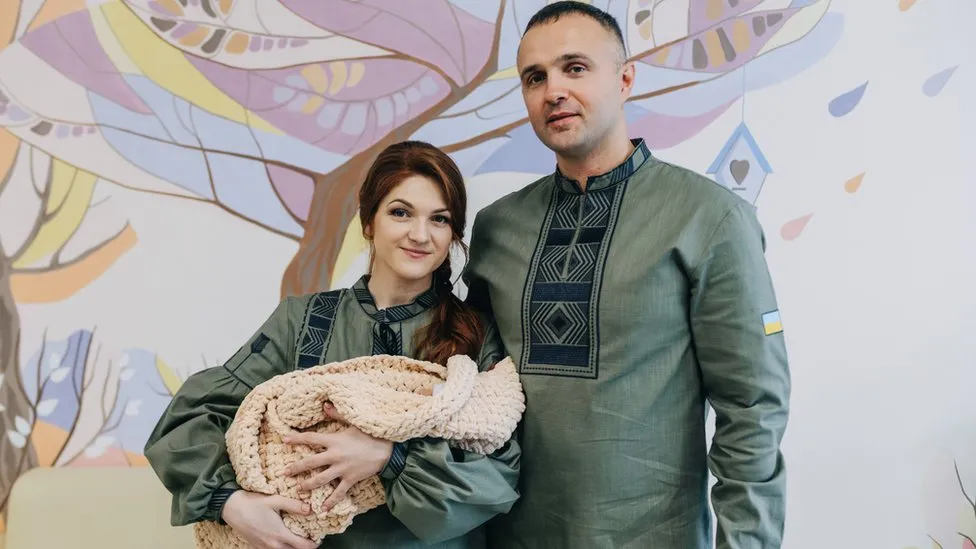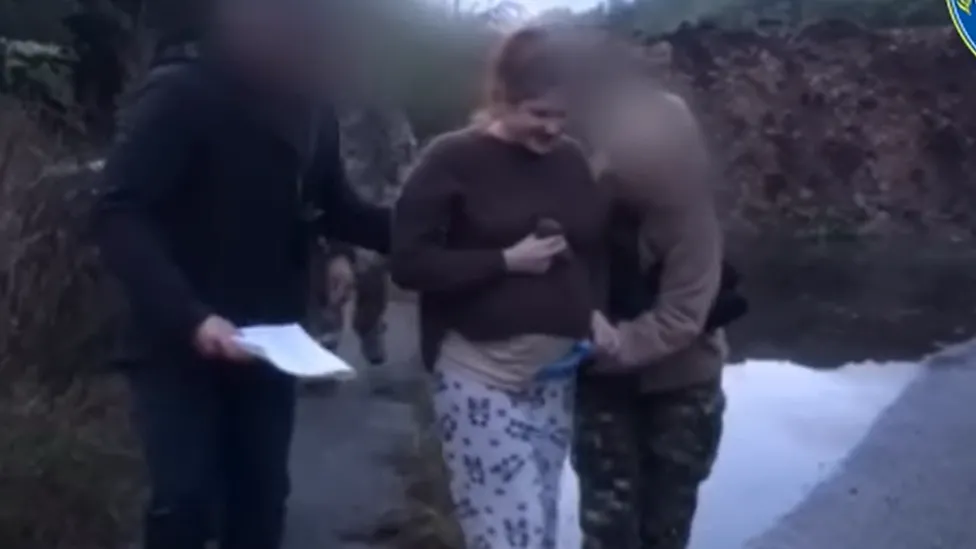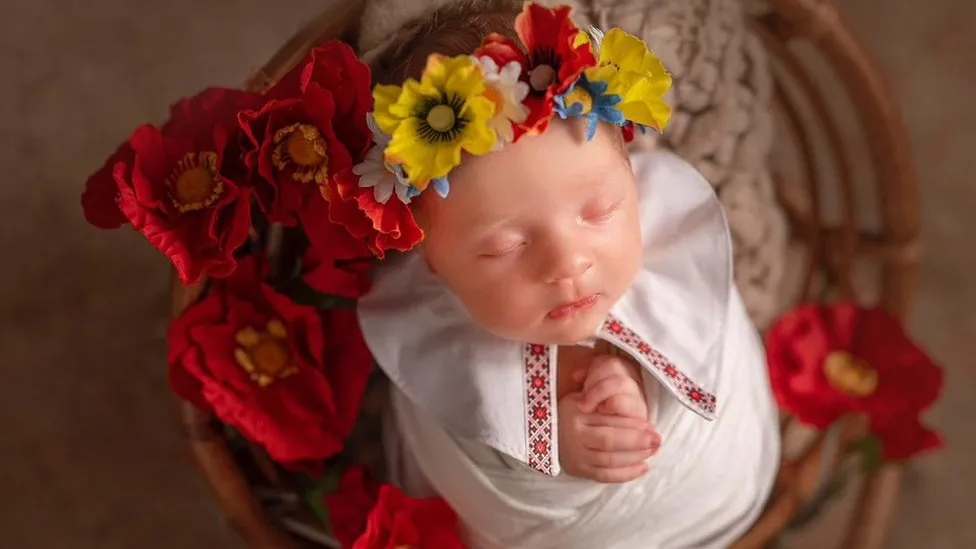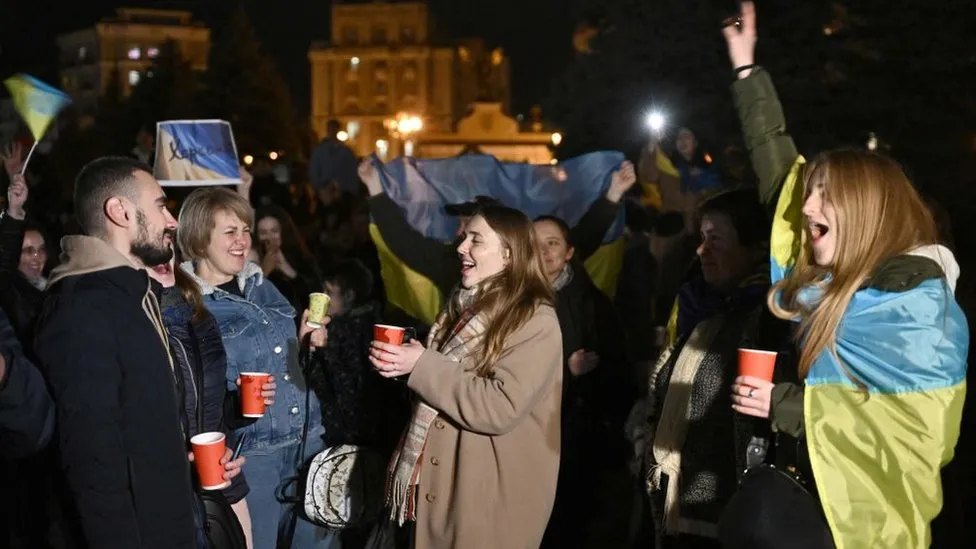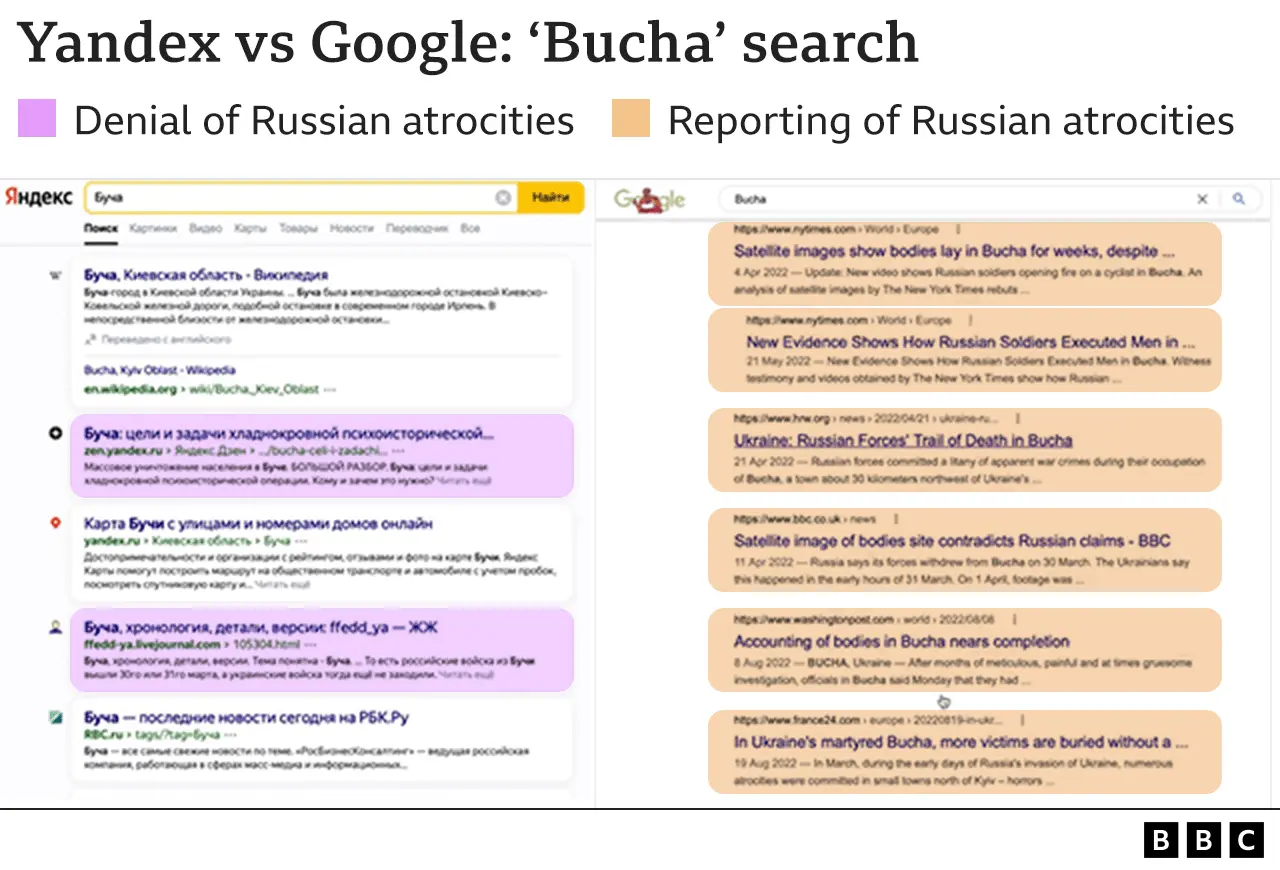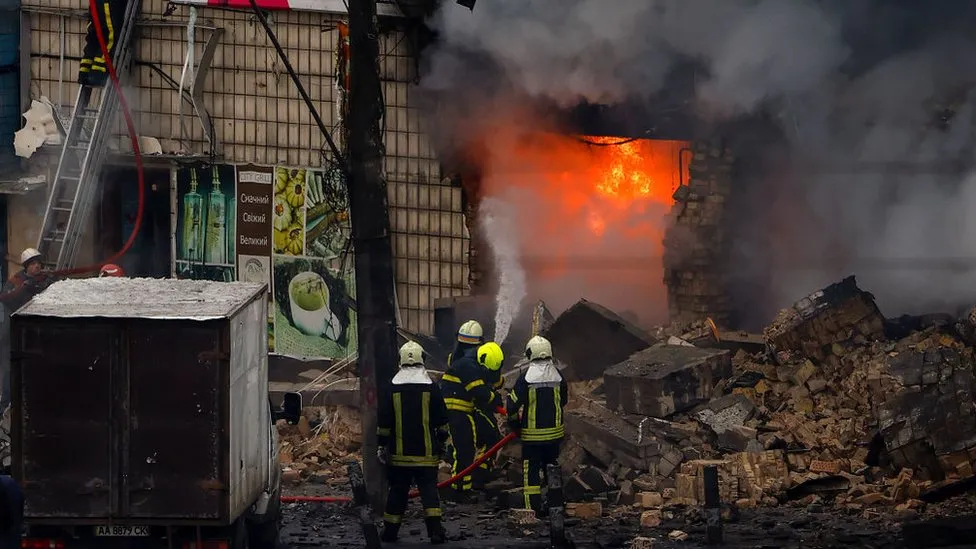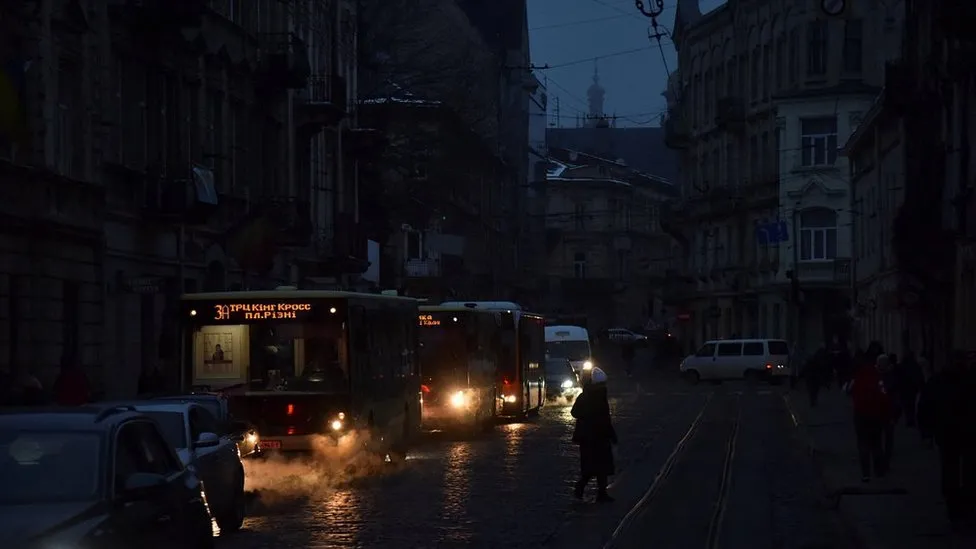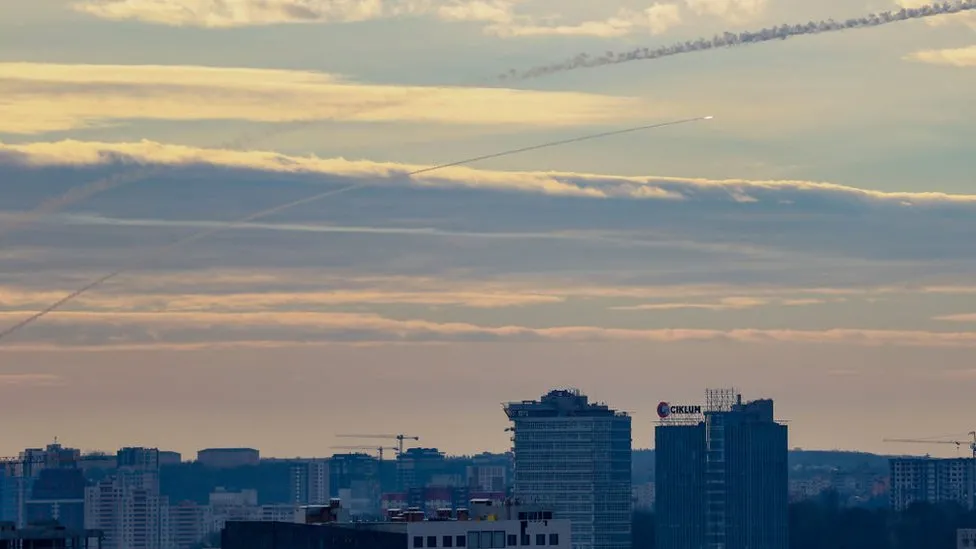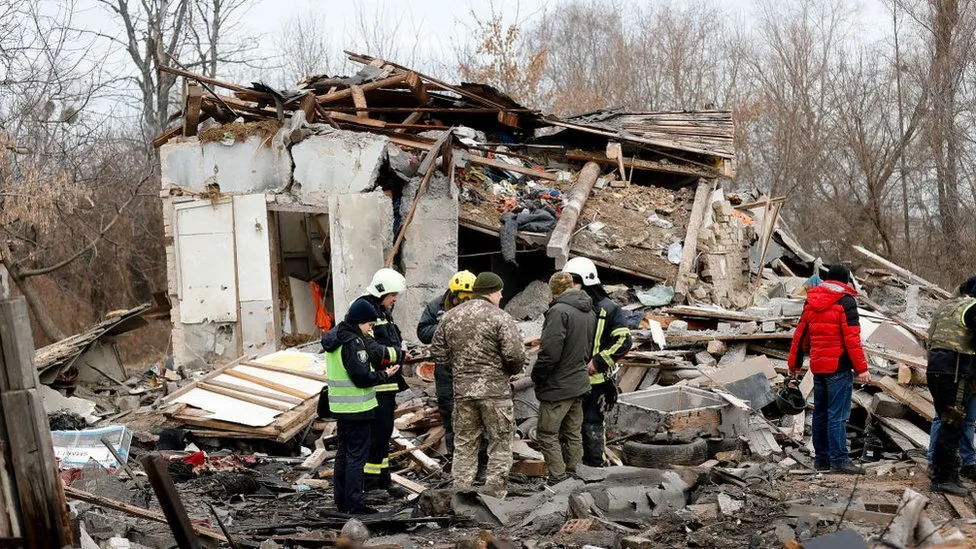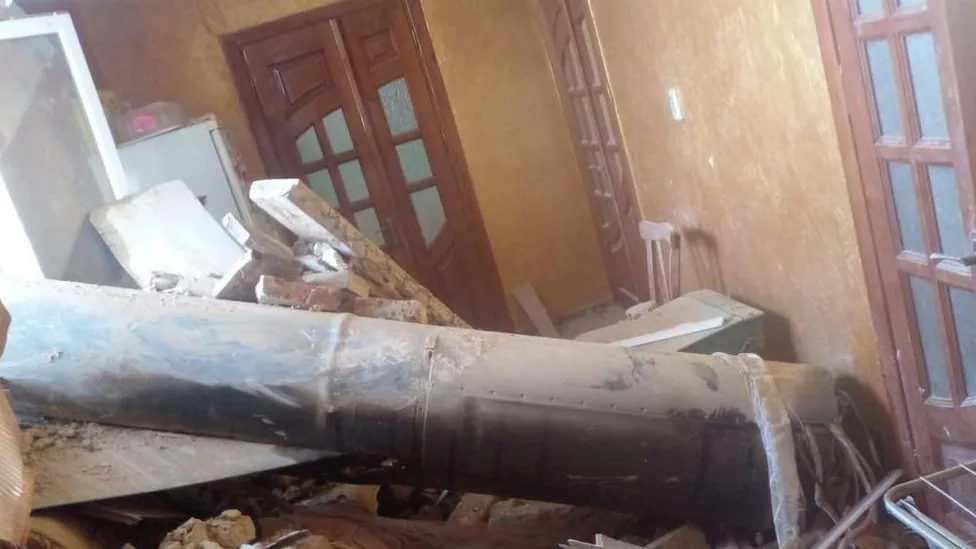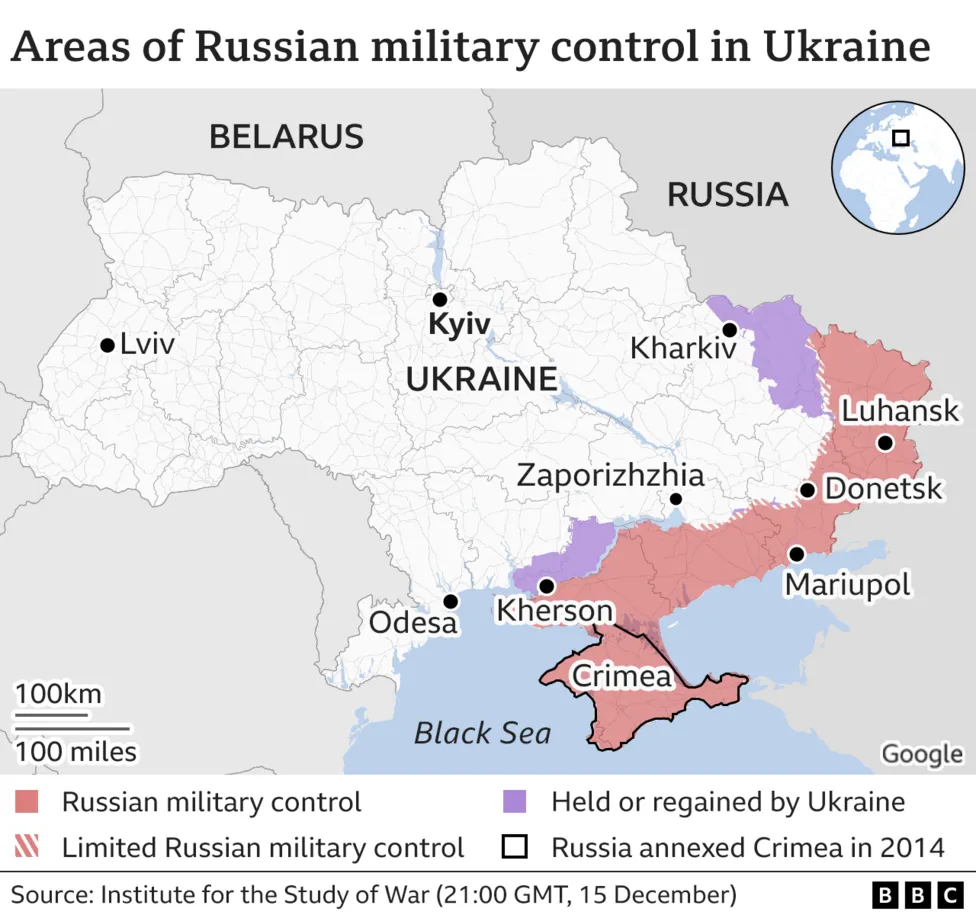Ukraine war: Tales of endurance and hardship as winter looms
Published 11 hours ago
By Jeremy Bowen
BBC News, Ukraine
A man being treated in Bakhmut war hospital
Image caption, This man was being treated for shrapnel wounds
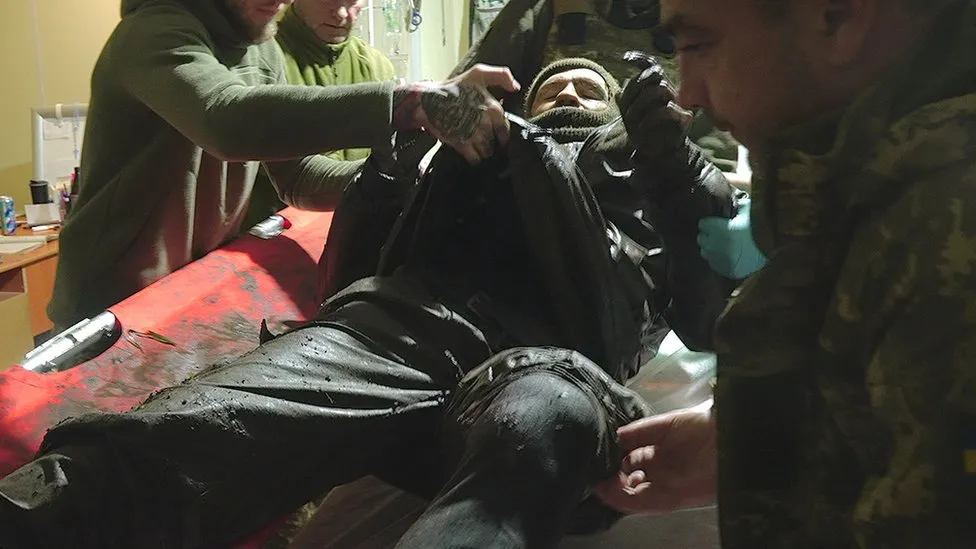
Piles of blood-stained stretchers stand ready outside the war hospital in the eastern Ukrainian city of Bakhmut.
Medics taking a break, and soldiers who have brought in wounded comrades, stand in the doorway smoking, listening to the incessant drum of heavy autumn rain, punctuated by sharp blasts and dull crumps of shellfire.
In the street outside are the burnt-out hulks of cars and vans. Broken glass and smashed masonry are piling up next to buildings that have been hit.
A couple of dogs, once family pets judging by their desire for human company, shrink into corners of the porch. One of them lies trembling, not interested in scraps of food offered by the soldiers.
Most of Bakhmut's civilians have long since moved to somewhere safer. The living creatures still there under fire share a certain solidarity. The dog, one of the exhausted-looking hospital staff explained, was traumatised by the sound of explosions.
On a journey from Bakhmut in Donbas in the east, to the other end of the front line in Kherson Oblast, it was clear that Ukrainians are tired, battered, locked into the debilitating routines of war, but still determined to fight the Russians to stay independent.
Russian President Vladimir Putin's decision in February to invade, to subdue a people he claims are the same as Russians, has sharpened their sense of nationhood.
The surgeon
One of the surgeons at the war hospital in Bakhmut, Volodymyr Pihulevsky, agreed to talk. He worked in emergency medicine in a civilian hospital until he was mobilised on 24 March.
We spoke in an improvised operating theatre, with two tables. It was clean and well supplied, but the monitors and resuscitation equipment in it were basic.
The hospital was quiet, as rain pelted down from low cloud that hung over Bakhmut - weather that usually reduces the volume of shelling. The theatre was not in use, so Volodymyr had time to talk.
"Fortunately, this morning, there are not so many wounded people. But there were days and even weeks when there were lots of wounded, including shrapnel wounds, traumatic leg amputations as a result of shelling or mine explosions, also bullet wounds.
"We have had to work 24 hours a day, even two days in a row without even a chance to sit down - we just stop for food, or the toilet."
Volodymyr Pihulevsky, a surgeon at a hospital in Bakhmut
Image caption, Surgeon Volodymyr Pihulevsky describes the work he has to carry out as "scary"
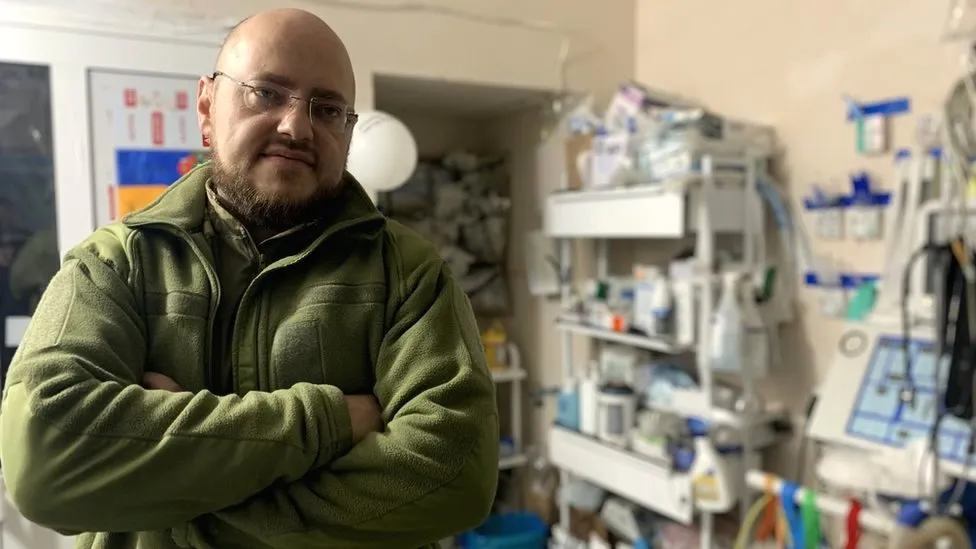
Volodymyr also takes his turn on the front line, giving immediate medical aid to the wounded.
"This was very difficult. Sometimes the choice is between risking your own life and the lives of wounded guys. I've never seen someone to be scared to die. No-one sits and waits even during the shelling. Everyone goes to take the wounded, to give them first aid. Then we put them in a car and bring them here.
"It is not as psychologically difficult as it is scary… only people with a mental illness don't have fear."
The surgeon said that in the war hospital they had to treat wounds that before the invasion they might see once or twice in a few years.
"Working in the emergency hospital, I saw many deaths. But that was in peacetime. Here I see how our boys fight. The wounds they receive ruin their lives. It depresses me more than anything else.
"It's terrible to see the pain of our soldiers. To see the trauma they get in this war. The most terrible thing is to see the suffering of our country. This is the most terrible. The rest is just our job."
A few minutes later a soldier walked in from an ambulance with a hand smashed by a sniper bullet. Another was carried in on a stretcher, soaked in mud and blood with multiple shrapnel wounds. Volodymyr walked rapidly to the triage area to get to work.
Anyone expecting the histrionics of emergency rooms in TV mini-series would be disappointed. Volodymyr and the medics in Bakhmut were calm, spoke quietly, and moved fast to stabilise the patients before more men were brought in from the front line.
The artilleryman
To get to the fighting means driving along tracks churned into deep mud in the endless farmland.
Our BBC team had permission to visit an artillery unit tucked away in a narrow stretch of woods in a valley. We promised not to say anything to reveal the location of their dugouts, other than the fact that their camp was on one of the Donbas front lines.
The constant soundtrack was shellfire - sometimes close, loud, sharp exchanges with the Russians, sometimes bass notes rumbling in from further down the long and active confrontation line.
The unit was armed with two BM-21 Grad missile launchers. The man in charge of one of them did not want to use his real name. Call me Lysyi, he said, a nickname that means "Bald".
Image caption, The artilleryman nicknamed Lysyi (R) says he is fond of the BM-21 Grad missile launcher, which is more than 50 years old
Before he signed a military contract in 2019, the artilleryman was a builder, who renovated apartments. Now he commands a highly destructive weapons system, whose designers in the Soviet Union in the late 1950s mounted an oblong array of 40 missile firing barrels on a powerful truck. The BM-21 is a tried and trusted killing machine. It can devastate an area of around a hectare (10,000 sq m) - in other words a large field of vehicles and troops.
Lysyi is in his early 30s. He supervised the loading and firing of the Grad like a man who had plenty of practice. It is not high tech. His crew screwed the fuses on to the front of the missiles by hand and tightened a small fastening to keep them in place. Then they manhandled the missiles into the barrels. When one of them failed to click into place, Lysyi gave it a shove with his insulated, knee-high Wellington boot. All the men wore them, as the autumn mud is so deep and viscous.
The artilleryman was matter-of-fact about his life since the invasion.
"I was woken up at 4:20am February 24th. Since then, I've been fighting. It's the same as it was at the beginning. It is very monotonous. We move from place to place.
"What do I do? We go and launch shells at the targets that they give us. We are fighting. No-one said this was going to be easy. But we manage."
The unit's two BM-21 launchers are both parked in scrapes bulldozed out of the hillside. They don't fire from their camp.
When the target co-ordinates came through, the truck and its missiles were driven out of the scrape, a green monster emerging from liquid mud that went halfway up its huge tyres. The Grad lumbered through more mud to a wide-open field on higher ground, that looked badly exposed and felt it when Russian shells started landing.
Lysyi and his men worked fast, ignoring the impacts about a hundred yards (91 metres) away, and let loose two volleys of missiles. Then they have to pack up and move fast before the Russians hit their position with counter battery fire. I could see the smoke and flame as a couple more Russian shells detonated.
Our Hyundai 4x4, defeated by the struggle to follow the huge BM-21 through the thick mud, would not start. At least the mud absorbed some of the force of the incoming shells. Before the Russian gunners could find their range, Lysyi and his men stopped so we could hop aboard their BM-21. They took us back to a safer place, then they went back to rescue the 4x4 and its driver, who had stayed under fire trying to start it.
Off-road vehicles, even ones that might have spent earlier, peacetime lives on the school run, are in short supply in Ukraine.
Back at the camp, Lysyi said they would like more modern equipment, but he had a grudging affection for the ancient Grad BM-21.
"My truck is 52 or 53 years old. We repair it on our own, give her a second life, because it's our lives at stake."
What about the operation we had just seen, launching missiles under fire, and driving in a vehicle more than half a century old over a field clogged with mud as more shells landed?
"Of course, everyone is scared. But we overcome our fear and go fight. There was shelling. Nothing dramatic. We escaped the shelling. Our 'old lady' helped us. We escaped."
Map shows the cities and villages of Soledar, Bakhmut, Kramatorsk, Dnipro, Kryvyi Rih and Myroliubivka in eastern and central Ukraine
The teacher
Liudmyla Mymrykova loves her home village. It is mostly in ruins now, but it is easy to see how before the war Myroliubivka must have been a peaceful oasis in the farmland around the city of Kherson. All the houses have their own land. Wild birds perch on the woodpiles, in search of insects. Ducks, chickens and geese wander through the overgrown gardens of owners who fled months ago.
Ukrainian soldiers, who recaptured the village in September as they started their push towards Kherson, have taken over the few houses that have intact walls and roofs. One of them is Liudmyla's, with neat rows of fruit trees and roses that need pruning.
I met her in a safer city nearly two hours away, in a tiny house lent to her by relatives. As her great-grandson Anatoly, almost a toddler, gurgled and played in the room next door, Liudmyla told me how she longs to go home, and how her beloved village descended into hell when the Russians captured it in March. How she survived months of terror, and how she was beaten, cut and raped in her own living room.
Liudmyla (right) with her daughter Olha
Image caption, Liudmyla (R), with daughter Olha, says she did not think she would survive the night a Russian soldier entered her home
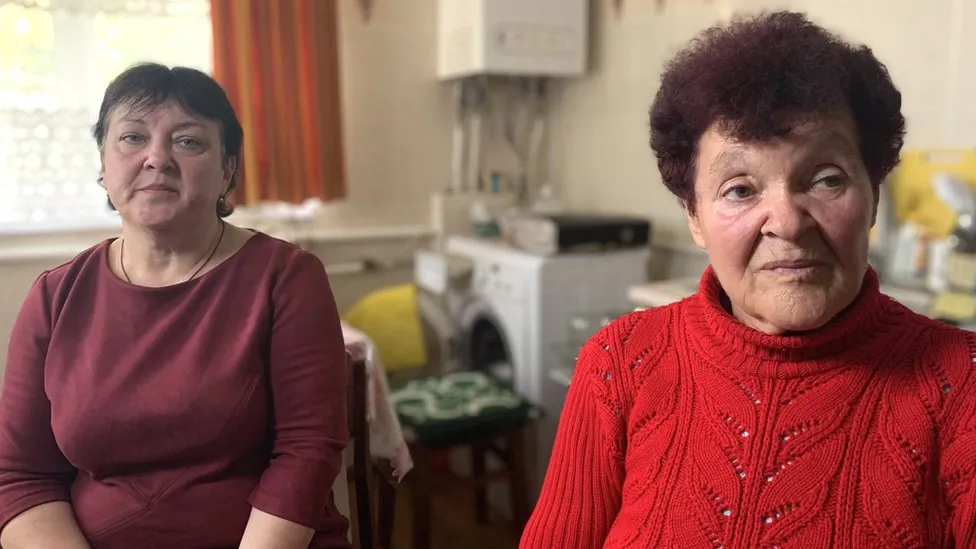
Liudmyla is a composed woman of 75, a widow who was a teacher until she retired, and well known locally as the village's historian. At the start of the year she did not believe that President Putin would order his men deeper into Ukraine, with such brutal consequences.
"We considered them to be a fraternal nation. I couldn't imagine [they] could do things like that to people."
The Russians arrived on 24 March. The first ones, Liudmyla said, came through Crimea, and behaved well. Often in wars frontline soldiers are more disciplined than rear echelon troops who follow them.
The worst came from the east, from militias raised in the separatist, pro-Moscow Ukrainian regimes in Luhansk and Donetsk. They terrorised the village, demanding vodka and wine, stealing cars and fuel and looting houses. The militiamen took men away in hoods, and tortured them - in at least one case until he died.
Liudmyla says that the Russian troops, who were frightening enough, "did not consider the militiamen to be human". The supposed allies fell out, drunkenly brawling with each other, and even exchanging gunfire.
A month into the occupation, Liudmyla had the chance to leave with her daughter Olha for territory held by the Ukrainians. But she refused Olha's pleas for her to get to safety, because she was hoping to safeguard her property, and especially the collection of documents she had assembled about the history of her village and her family.
Once Olha and a close friend who lived nearby had left, Liudmyla was alone, always scared, taking medication for high blood pressure but finding the strength to navigate her way through long, lonely days. Her dogs would bark when strangers approached. Then, on the night of 13 July: "At half past eleven I heard a very loud knock at my window.
"My body stiffened. Who could it be? My face, my body, my legs, my arms felt paralysed. I closed all the windows, but one of them was still a little open. I saw a soldier there. I hesitated about letting him in. What should I do? I didn't have anything to hit him. Would I be able to cope with him?
"When I opened the door, he immediately punched me in the face. He knocked out two of my teeth and broke my nose. I was covered with blood. He started beating me in the chest with the butt of his rifle. He hit my body. He started hitting me on the head. I didn't understand what I'd done wrong.
"He pulled my hair. And since it was dark in the kitchen, he couldn't see where he was, and he staggered around the furniture, then threw me onto the sofa and began to strangle me. I could not swallow water for two weeks.
"Then he took off my clothes and raped me. He cut my stomach. Until now, I have scars on my stomach. The deep ones still haven't healed, the smaller cuts have healed."
Image caption, Liudmyla Mymrykova kept the bullet dropped by the Russian soldier who attacked her at her home
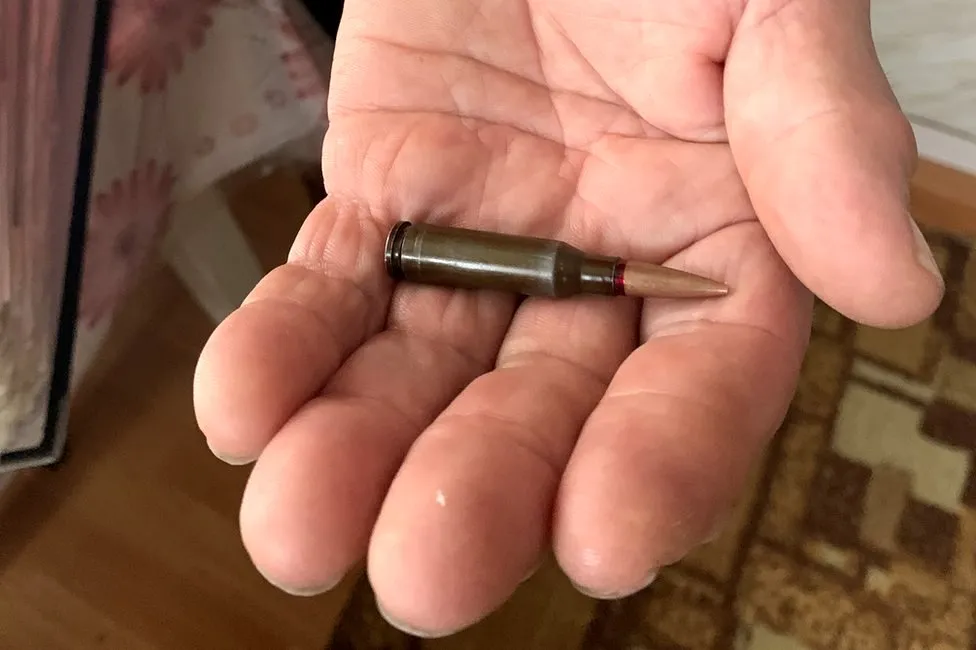
Liudmyla recognised the man, who was aged around 60 and stank of alcohol. He was, she thinks, from a separatist militia. He had already been to her house, stealing diesel, then bringing soldiers who had stayed there until she persuaded them to leave.
The rapist demanded tobacco and beat her again with his gun when she did not have any. He opened fire, spraying bullets around the room. Liudmyla expected to die. She thought of her family.
"I said goodbye to my children, my grandchildren, and great-grandchildren, I never thought I would stay alive."
He did not leave, she says, until 05:20 the next morning, telling her that if she reported what had happened to the Russians, he would come back to kill her. She stayed with neighbours, explaining away her injuries by pretending that she had fallen into the cellar.
On the phone, the strain in Luidmyla's voice told her daughter Olha that something terrible had happened. She pressed her mother, and in the end it was a relief for Luidmyla not to have to hide the attack.
Four days after the rape, she joined other Ukrainians who managed to get to a local town, still occupied by the Russians but away from her attacker, and from there managed to cross the front line to re-join her daughter and family.
In the kitchen of her borrowed house, sitting next to Olha, who is also a widow, Liudmyla Mymrykova explained why she wanted to talk about her ordeal. It was the only time in an interview that lasted around an hour that her eyes filled with tears. In her hand she held a bullet that, she said, the man had dropped before he left her house.
"I want to shout to the whole world to stop all this, to stop this bloody war as soon as possible. I want Russians to know how their husbands, their sons, their parents are torturing Ukrainians. How are we guilty? We are hardworking, peaceful people. We don't disturb anyone."
I asked Liudmyla how she kept going when she had been through hell.
"How do I stay strong? The love of my land, and my native village, and my people. We're peaceful and hardworking in our village and supported each other during the occupation. They shared the last piece of bread. A lot of people were starving. We ground wheat seeds that had sprouted in a coffee grinder and baked cakes, because there was nothing to eat.
"This was a horror, this was simply a horror," she said.
"Putin and the Russians will never be forgiven until the end of their world… for what they did to the Ukrainians. There will be no forgiveness."
Published 11 hours ago
By Jeremy Bowen
BBC News, Ukraine
A man being treated in Bakhmut war hospital
Image caption, This man was being treated for shrapnel wounds

Piles of blood-stained stretchers stand ready outside the war hospital in the eastern Ukrainian city of Bakhmut.
Medics taking a break, and soldiers who have brought in wounded comrades, stand in the doorway smoking, listening to the incessant drum of heavy autumn rain, punctuated by sharp blasts and dull crumps of shellfire.
In the street outside are the burnt-out hulks of cars and vans. Broken glass and smashed masonry are piling up next to buildings that have been hit.
A couple of dogs, once family pets judging by their desire for human company, shrink into corners of the porch. One of them lies trembling, not interested in scraps of food offered by the soldiers.
Most of Bakhmut's civilians have long since moved to somewhere safer. The living creatures still there under fire share a certain solidarity. The dog, one of the exhausted-looking hospital staff explained, was traumatised by the sound of explosions.
On a journey from Bakhmut in Donbas in the east, to the other end of the front line in Kherson Oblast, it was clear that Ukrainians are tired, battered, locked into the debilitating routines of war, but still determined to fight the Russians to stay independent.
Russian President Vladimir Putin's decision in February to invade, to subdue a people he claims are the same as Russians, has sharpened their sense of nationhood.
The surgeon
One of the surgeons at the war hospital in Bakhmut, Volodymyr Pihulevsky, agreed to talk. He worked in emergency medicine in a civilian hospital until he was mobilised on 24 March.
We spoke in an improvised operating theatre, with two tables. It was clean and well supplied, but the monitors and resuscitation equipment in it were basic.
The hospital was quiet, as rain pelted down from low cloud that hung over Bakhmut - weather that usually reduces the volume of shelling. The theatre was not in use, so Volodymyr had time to talk.
"Fortunately, this morning, there are not so many wounded people. But there were days and even weeks when there were lots of wounded, including shrapnel wounds, traumatic leg amputations as a result of shelling or mine explosions, also bullet wounds.
"We have had to work 24 hours a day, even two days in a row without even a chance to sit down - we just stop for food, or the toilet."
Volodymyr Pihulevsky, a surgeon at a hospital in Bakhmut
Image caption, Surgeon Volodymyr Pihulevsky describes the work he has to carry out as "scary"

Volodymyr also takes his turn on the front line, giving immediate medical aid to the wounded.
"This was very difficult. Sometimes the choice is between risking your own life and the lives of wounded guys. I've never seen someone to be scared to die. No-one sits and waits even during the shelling. Everyone goes to take the wounded, to give them first aid. Then we put them in a car and bring them here.
"It is not as psychologically difficult as it is scary… only people with a mental illness don't have fear."
The surgeon said that in the war hospital they had to treat wounds that before the invasion they might see once or twice in a few years.
"Working in the emergency hospital, I saw many deaths. But that was in peacetime. Here I see how our boys fight. The wounds they receive ruin their lives. It depresses me more than anything else.
"It's terrible to see the pain of our soldiers. To see the trauma they get in this war. The most terrible thing is to see the suffering of our country. This is the most terrible. The rest is just our job."
A few minutes later a soldier walked in from an ambulance with a hand smashed by a sniper bullet. Another was carried in on a stretcher, soaked in mud and blood with multiple shrapnel wounds. Volodymyr walked rapidly to the triage area to get to work.
Anyone expecting the histrionics of emergency rooms in TV mini-series would be disappointed. Volodymyr and the medics in Bakhmut were calm, spoke quietly, and moved fast to stabilise the patients before more men were brought in from the front line.
The artilleryman
To get to the fighting means driving along tracks churned into deep mud in the endless farmland.
Our BBC team had permission to visit an artillery unit tucked away in a narrow stretch of woods in a valley. We promised not to say anything to reveal the location of their dugouts, other than the fact that their camp was on one of the Donbas front lines.
The constant soundtrack was shellfire - sometimes close, loud, sharp exchanges with the Russians, sometimes bass notes rumbling in from further down the long and active confrontation line.
The unit was armed with two BM-21 Grad missile launchers. The man in charge of one of them did not want to use his real name. Call me Lysyi, he said, a nickname that means "Bald".
Image caption, The artilleryman nicknamed Lysyi (R) says he is fond of the BM-21 Grad missile launcher, which is more than 50 years old
Before he signed a military contract in 2019, the artilleryman was a builder, who renovated apartments. Now he commands a highly destructive weapons system, whose designers in the Soviet Union in the late 1950s mounted an oblong array of 40 missile firing barrels on a powerful truck. The BM-21 is a tried and trusted killing machine. It can devastate an area of around a hectare (10,000 sq m) - in other words a large field of vehicles and troops.
Lysyi is in his early 30s. He supervised the loading and firing of the Grad like a man who had plenty of practice. It is not high tech. His crew screwed the fuses on to the front of the missiles by hand and tightened a small fastening to keep them in place. Then they manhandled the missiles into the barrels. When one of them failed to click into place, Lysyi gave it a shove with his insulated, knee-high Wellington boot. All the men wore them, as the autumn mud is so deep and viscous.
The artilleryman was matter-of-fact about his life since the invasion.
"I was woken up at 4:20am February 24th. Since then, I've been fighting. It's the same as it was at the beginning. It is very monotonous. We move from place to place.
"What do I do? We go and launch shells at the targets that they give us. We are fighting. No-one said this was going to be easy. But we manage."
The unit's two BM-21 launchers are both parked in scrapes bulldozed out of the hillside. They don't fire from their camp.
When the target co-ordinates came through, the truck and its missiles were driven out of the scrape, a green monster emerging from liquid mud that went halfway up its huge tyres. The Grad lumbered through more mud to a wide-open field on higher ground, that looked badly exposed and felt it when Russian shells started landing.
Lysyi and his men worked fast, ignoring the impacts about a hundred yards (91 metres) away, and let loose two volleys of missiles. Then they have to pack up and move fast before the Russians hit their position with counter battery fire. I could see the smoke and flame as a couple more Russian shells detonated.
Our Hyundai 4x4, defeated by the struggle to follow the huge BM-21 through the thick mud, would not start. At least the mud absorbed some of the force of the incoming shells. Before the Russian gunners could find their range, Lysyi and his men stopped so we could hop aboard their BM-21. They took us back to a safer place, then they went back to rescue the 4x4 and its driver, who had stayed under fire trying to start it.
Off-road vehicles, even ones that might have spent earlier, peacetime lives on the school run, are in short supply in Ukraine.
Back at the camp, Lysyi said they would like more modern equipment, but he had a grudging affection for the ancient Grad BM-21.
"My truck is 52 or 53 years old. We repair it on our own, give her a second life, because it's our lives at stake."
What about the operation we had just seen, launching missiles under fire, and driving in a vehicle more than half a century old over a field clogged with mud as more shells landed?
"Of course, everyone is scared. But we overcome our fear and go fight. There was shelling. Nothing dramatic. We escaped the shelling. Our 'old lady' helped us. We escaped."
Map shows the cities and villages of Soledar, Bakhmut, Kramatorsk, Dnipro, Kryvyi Rih and Myroliubivka in eastern and central Ukraine
The teacher
Liudmyla Mymrykova loves her home village. It is mostly in ruins now, but it is easy to see how before the war Myroliubivka must have been a peaceful oasis in the farmland around the city of Kherson. All the houses have their own land. Wild birds perch on the woodpiles, in search of insects. Ducks, chickens and geese wander through the overgrown gardens of owners who fled months ago.
Ukrainian soldiers, who recaptured the village in September as they started their push towards Kherson, have taken over the few houses that have intact walls and roofs. One of them is Liudmyla's, with neat rows of fruit trees and roses that need pruning.
I met her in a safer city nearly two hours away, in a tiny house lent to her by relatives. As her great-grandson Anatoly, almost a toddler, gurgled and played in the room next door, Liudmyla told me how she longs to go home, and how her beloved village descended into hell when the Russians captured it in March. How she survived months of terror, and how she was beaten, cut and raped in her own living room.
Liudmyla (right) with her daughter Olha
Image caption, Liudmyla (R), with daughter Olha, says she did not think she would survive the night a Russian soldier entered her home

Liudmyla is a composed woman of 75, a widow who was a teacher until she retired, and well known locally as the village's historian. At the start of the year she did not believe that President Putin would order his men deeper into Ukraine, with such brutal consequences.
"We considered them to be a fraternal nation. I couldn't imagine [they] could do things like that to people."
The Russians arrived on 24 March. The first ones, Liudmyla said, came through Crimea, and behaved well. Often in wars frontline soldiers are more disciplined than rear echelon troops who follow them.
The worst came from the east, from militias raised in the separatist, pro-Moscow Ukrainian regimes in Luhansk and Donetsk. They terrorised the village, demanding vodka and wine, stealing cars and fuel and looting houses. The militiamen took men away in hoods, and tortured them - in at least one case until he died.
Liudmyla says that the Russian troops, who were frightening enough, "did not consider the militiamen to be human". The supposed allies fell out, drunkenly brawling with each other, and even exchanging gunfire.
A month into the occupation, Liudmyla had the chance to leave with her daughter Olha for territory held by the Ukrainians. But she refused Olha's pleas for her to get to safety, because she was hoping to safeguard her property, and especially the collection of documents she had assembled about the history of her village and her family.
Once Olha and a close friend who lived nearby had left, Liudmyla was alone, always scared, taking medication for high blood pressure but finding the strength to navigate her way through long, lonely days. Her dogs would bark when strangers approached. Then, on the night of 13 July: "At half past eleven I heard a very loud knock at my window.
"My body stiffened. Who could it be? My face, my body, my legs, my arms felt paralysed. I closed all the windows, but one of them was still a little open. I saw a soldier there. I hesitated about letting him in. What should I do? I didn't have anything to hit him. Would I be able to cope with him?
"When I opened the door, he immediately punched me in the face. He knocked out two of my teeth and broke my nose. I was covered with blood. He started beating me in the chest with the butt of his rifle. He hit my body. He started hitting me on the head. I didn't understand what I'd done wrong.
"He pulled my hair. And since it was dark in the kitchen, he couldn't see where he was, and he staggered around the furniture, then threw me onto the sofa and began to strangle me. I could not swallow water for two weeks.
"Then he took off my clothes and raped me. He cut my stomach. Until now, I have scars on my stomach. The deep ones still haven't healed, the smaller cuts have healed."
Image caption, Liudmyla Mymrykova kept the bullet dropped by the Russian soldier who attacked her at her home

Liudmyla recognised the man, who was aged around 60 and stank of alcohol. He was, she thinks, from a separatist militia. He had already been to her house, stealing diesel, then bringing soldiers who had stayed there until she persuaded them to leave.
The rapist demanded tobacco and beat her again with his gun when she did not have any. He opened fire, spraying bullets around the room. Liudmyla expected to die. She thought of her family.
"I said goodbye to my children, my grandchildren, and great-grandchildren, I never thought I would stay alive."
He did not leave, she says, until 05:20 the next morning, telling her that if she reported what had happened to the Russians, he would come back to kill her. She stayed with neighbours, explaining away her injuries by pretending that she had fallen into the cellar.
On the phone, the strain in Luidmyla's voice told her daughter Olha that something terrible had happened. She pressed her mother, and in the end it was a relief for Luidmyla not to have to hide the attack.
Four days after the rape, she joined other Ukrainians who managed to get to a local town, still occupied by the Russians but away from her attacker, and from there managed to cross the front line to re-join her daughter and family.
In the kitchen of her borrowed house, sitting next to Olha, who is also a widow, Liudmyla Mymrykova explained why she wanted to talk about her ordeal. It was the only time in an interview that lasted around an hour that her eyes filled with tears. In her hand she held a bullet that, she said, the man had dropped before he left her house.
"I want to shout to the whole world to stop all this, to stop this bloody war as soon as possible. I want Russians to know how their husbands, their sons, their parents are torturing Ukrainians. How are we guilty? We are hardworking, peaceful people. We don't disturb anyone."
I asked Liudmyla how she kept going when she had been through hell.
"How do I stay strong? The love of my land, and my native village, and my people. We're peaceful and hardworking in our village and supported each other during the occupation. They shared the last piece of bread. A lot of people were starving. We ground wheat seeds that had sprouted in a coffee grinder and baked cakes, because there was nothing to eat.
"This was a horror, this was simply a horror," she said.
"Putin and the Russians will never be forgiven until the end of their world… for what they did to the Ukrainians. There will be no forgiveness."
